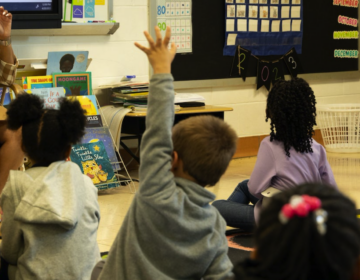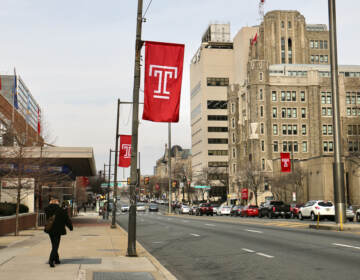Penn foundation’s Nowak unafraid of ruffling feathers
ListenThe Delaware Valley’s largest philanthropic foundation made a big splash this month, announcing $32 million in grants — including $15 million that will go to Philadelphia’s public, charter, and parochial schools.
Jeremy Nowak, the new president of the William Penn Foundation, says that Philadelphia is standing at a crossroads.
“There’s a scenario where this becomes one of the great cities in America, and there’s a scenario where we keep going in decline. This is a critical time for us to decide which direction we want to go,” Nowak said.
With over $2 billion at his disposal, Nowak hopes to have a major influence on that direction. He says the foundation will pursue three main strategies.
“One way is to have leverage related to schools, and trying to help low income kids close the achievement gap,” Nowak said. “Another way is to help make this region one of the most environmentally sustainable and successful regions in the nation. And a third way is to make sure that we are one of the most creative and culturally vibrant regions in the world.”
William Penn has given grants in those areas for decades. But Nowak, who has been at the helm of the foundation for barely a year, is bringing some new twists to William Penn’s long-standing approach.
He says that Philadelphia must address the consequences of losing 500,000 people over the past 50 years. That includes dealing with tangible problems, like thousands of vacant buildings, dozens of half-empty schools, and large areas of intense poverty. There’s also a harder-to-define problem that Nowak wants the William Penn Foundation to help tackle.
“I would say that, in this city, our expectations have been too low — that you can’t have great grocery stores in some neighborhoods, that you can’t have great schools in some neighborhoods, that you can’t have a public transportation system that is as reliable as we’d like,” he said. “I’d say we need to shift expectations.”
To do that, Nowak wants to bring some changes to how William Penn gives out its money.
“You shift expectations not simply by shifting policy. You shift expectations by supporting great practices, whether they’re in civil society, the public sector, or the private sector,” he said.
In that vein, the foundation gave a monster $15 million grant to the Philadelphia School Partnership earlier this month. PSP’s plan is to pass that money on directly to schools that are doing well, regardless of whether they’re Catholic, charter, or managed by the Philadelphia school district.
“I think people in Philadelphia are ready to say this is one district,” said Nowak. “The district manages both its district schools and its charter schools. And what it needs to do going forward is to figure out how to do the best with both of them and figure out how they work together.”
But that approach has already ruffled some feathers.
When the PSP made its first set of gifts last week, no district-run schools were included, fueling concerns among some that charters are being favored at the expense of traditional public schools.
The William Penn Foundation has also provoked stiff community opposition for its support of the School Reform Commission’s controversial proposal to close more than 60 schools and break the school district up into smaller pieces. In addition to giving over $1 million to the consultants who helped put the proposal together, Nowak is also funding a $160,000 public relations campaign in support of the plan, prompting some to complain the foundation is seeking to exert too much influence over the cash-strapped district.
“There is pain, and the pain is everywhere. And because of that, people are going to understandably be upset and be nervous,” Nowak said. “There’s good reason for them to be. I do not blame them … Part of what we’re going through right now is an enormous, very frightening moment of change.”
Despite the opposition, Nowak, who is not known for his patience, is pushing ahead. Though he describes Philadelphia as particularly resistant to big changes, he says that under his watch, the William Penn Foundation won’t be afraid to take risks, even when they’re unpopular.
“This is a city that’s going to have to figure out whether it wants to be captive by its past or whether it wants to lean toward the future,” he said.
Nowak and the William Penn Foundation are expected to announce details of 10-year strategic plan later this year.
Disclosure: Both WHYY and the Public School Notebook receive funding from the William Penn Foundation. You can read more from Benjamin Herold’s interview with Jeremy Nowak online at the Philadelphia Public School Notebook.
WHYY is your source for fact-based, in-depth journalism and information. As a nonprofit organization, we rely on financial support from readers like you. Please give today.




